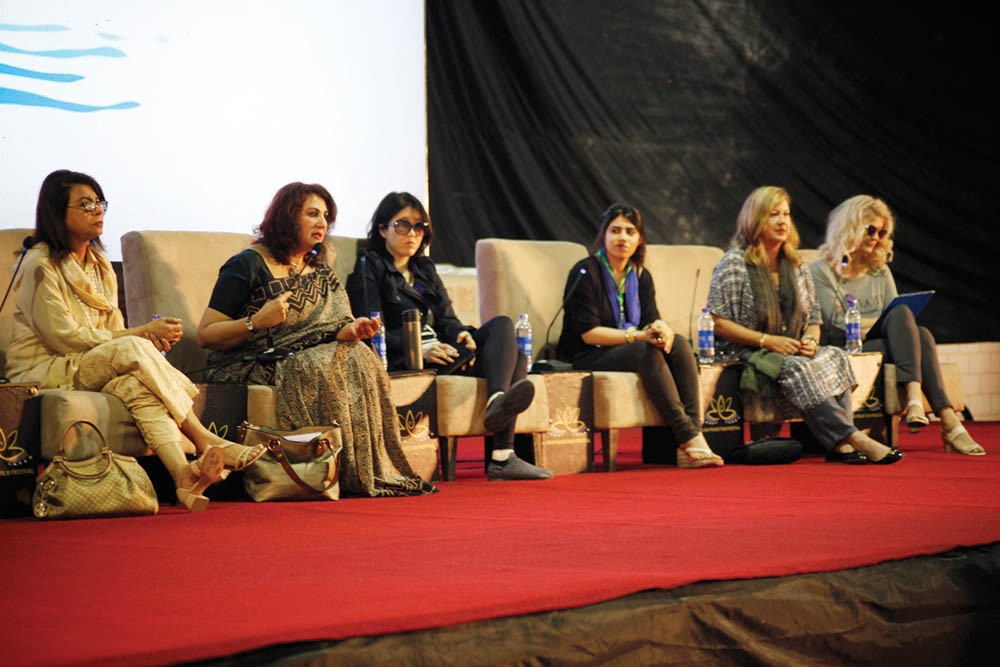
Asia Peace Film Festival celebrates diversity using the medium of films

In trying to become more inclusive in storytelling and narratives, the Pakistani media industry gladly opened its doors to the international market with the holding of the Asia Peace Film Festival (APFF) in Karachi. After a successful event in Islamabad last year, APFF was brought to Karachi this year to cater to a more diverse audience.
Karachi has evolved as the biggest cosmopolitan city in Pakistan, representing a truly multi-ethnic, multicultural and multi-lingual landscape. To celebrate the plural and inclusive identity of Karachi, APFF not just organised movie screenings but had workshops and discussions during the four-day festival, touching upon topics from the role of women in cinema to the promotion of peace through movies.
The event was inaugurated by Chief Minister Sindh Syed Murad Ali Shah, who lauded the efforts of Culture Minister Syed Sardar Ali Shah for organising such events that promoted peace and harmony in the society. He also mentioned that the festival would promote tourism since 400 foreigners came to Karachi for it.
The panel on ‘Film and Representation of Women -- How to Reverse Patriarchal Stereotypes through Cinema’ was one of the most heated ones. It was moderated by Feryal Ali Gauhar, acclaimed Pakistani actress, television writer and human rights activist. The panel was a perfect mix of the harsh realities of cinema and critical insights on peace and culture.
Talking about the representation of women in Pakistani cinema, Gauhar was of the opinion that unfortunately it is a sad situation where women tend to be hushed and discouraged since we live predominantly in a patriarchal society.
Seema Tahir, renowned TV producer, was of the view that the origin of the patriarchal system was initiated by landlords and the feudal system. "It was never something encouraged in any literate and educated society," said Tahir. "Therefore, in order to develop and maintain a balanced society, it is extremely important to eliminate the stereotypical idea of discouraging women from working, not just in the film industry but in any field whatsoever."
The discussion was carried forward by Bee Gul, a screenwriter and director known for writing controversial plays and hard hitting stories, who agreed that it was about time the society’s mindset was changed.
Fatemeh Moosavi, a filmmaker from Iran, stated her concern about the Iranian film industry, where she said that it was difficult for women to work or voice their opinion living in a conventional society. Hence, it was extremely necessary to reverse the patriarchal mindset with the help of cinema.
Maariya Sayed, a filmmaker from India, responding to one of the questions from the moderator regarding the state of Indian cinema and the role women play in Indian society, said: "It is a constant struggle competing with the mainstream cinema. Women have a liberty to choose their path, however, it is difficult to voice their opinion as mostly it goes unnoticed."
Panelists from Bosnia and Korea presented their points of view. In the end, an interactive question and answer session was held, followed by the screening of an Iranian short film, Mother. With its heart-wrenching script and performance, the movie evoked a sudden gush of emotions among the audience.
Another important panel was ‘Peace and Culture: Alternative Perspectives and Critical Insights’ moderated by senior journalist Saqlain Imam. The panel included renowned representatives from the film industry and journalism. The discussion started with a question on how peace and culture can be promoted in the film industry to which Wajahat Rauf, director of Karachi se Lahore and Lahore se Aagay, said that "no matter how much effort we as producers or individuals put into promoting peace and breaking barriers by making films outside Pakistan, unless there is no support of embassies and government, it would not be possible to achieve the desired results".
Other panelists included Ali Arqam, Neelum Ahmad Bashir, Komeil Soheli and Imran Shaukat Ali. The conversations revolved around what people want to see and how far they should work under the guise of creative liberties. It was an insightful discussion amid criticism and diverse opinions.
Along with these sessions, around 109 movies were screened including short films, animations, documentaries and micromentaries from Iran, Turkey, Russia, Malaysia, Singapore, China, Bangladesh, India, Syria, Lebanon, Afghanistan and Pakistan etc. These were spread over four days of the festival. The best part of the festival was its soul -- peace. All the films carried social messages that affirmed how all Asian countries are similar in their traditions, cultures, and even problems.
Festivals like these should be held more often as they unite the entire region using arts as a mode of communication.